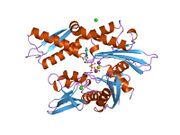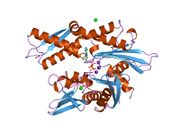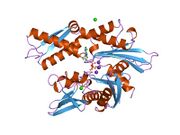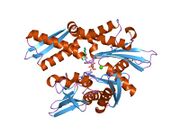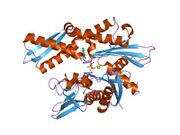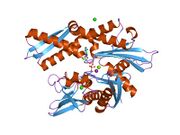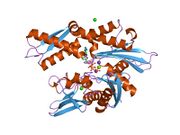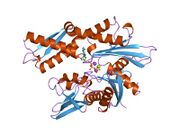Biology:HSPA2
From HandWiki
 Generic protein structure example |
Heat shock-related 70 kDa protein 2 is a protein that in humans is encoded by the HSPA2 gene.[1]
References
Further reading
- "Amino acid limitation and flow to the duodenum at four stages of lactation. 2. Extent of lysine limitation.". J. Dairy Sci. 75 (12): 3503–18. 1993. doi:10.3168/jds.S0022-0302(92)78126-0. PMID 1474216.
- "Structure and expression of a human gene coding for a 71 kd heat shock 'cognate' protein.". Nucleic Acids Res. 15 (13): 5181–97. 1987. doi:10.1093/nar/15.13.5181. PMID 3037489.
- "Cloning, sequencing, and mapping of the human chromosome 14 heat shock protein gene (HSPA2).". Genomics 23 (1): 85–93. 1995. doi:10.1006/geno.1994.1462. PMID 7829106.
- "A heat shock gene at 14q22: mapping and expression.". Hum. Mol. Genet. 3 (10): 1819–22. 1995. doi:10.1093/hmg/3.10.1819. PMID 7849706.
- "Human immunodeficiency virus type 1 interaction with the membrane of CD4+ cells induces the synthesis and nuclear translocation of 70K heat shock protein.". J. Gen. Virol. 75 (1): 193–9. 1994. doi:10.1099/0022-1317-75-1-193. PMID 7906708.
- "HSP70-2 is part of the synaptonemal complex in mouse and hamster spermatocytes.". Chromosoma 104 (6): 414–21. 1996. doi:10.1007/BF00352265. PMID 8601336. https://zenodo.org/record/1232411.
- "Targeted gene disruption of Hsp70-2 results in failed meiosis, germ cell apoptosis, and male infertility.". Proc. Natl. Acad. Sci. U.S.A. 93 (8): 3264–8. 1996. doi:10.1073/pnas.93.8.3264. PMID 8622925. Bibcode: 1996PNAS...93.3264D.
- "HSP70-2 is required for CDC2 kinase activity in meiosis I of mouse spermatocytes.". Development 124 (15): 3007–14. 1997. doi:10.1242/dev.124.15.3007. PMID 9247342.
- "Requirement for a kinase-specific chaperone pathway in the production of a Cdk9/cyclin T1 heterodimer responsible for P-TEFb-mediated tat stimulation of HIV-1 transcription.". J. Biol. Chem. 275 (1): 279–87. 2000. doi:10.1074/jbc.275.1.279. PMID 10617616.
- "Heat-shock protein 70 can replace viral protein R of HIV-1 during nuclear import of the viral preintegration complex.". Exp. Cell Res. 259 (2): 398–403. 2000. doi:10.1006/excr.2000.4992. PMID 10964507.
- "Directed proteomic analysis of the human nucleolus.". Curr. Biol. 12 (1): 1–11. 2002. doi:10.1016/S0960-9822(01)00650-9. PMID 11790298.
- "Specific incorporation of heat shock protein 70 family members into primate lentiviral virions.". J. Virol. 76 (9): 4666–70. 2002. doi:10.1128/JVI.76.9.4666-4670.2002. PMID 11932435.
- "Generation and initial analysis of more than 15,000 full-length human and mouse cDNA sequences.". Proc. Natl. Acad. Sci. U.S.A. 99 (26): 16899–903. 2003. doi:10.1073/pnas.242603899. PMID 12477932. Bibcode: 2002PNAS...9916899M.
- "Global profiling of the cell surface proteome of cancer cells uncovers an abundance of proteins with chaperone function.". J. Biol. Chem. 278 (9): 7607–16. 2003. doi:10.1074/jbc.M210455200. PMID 12493773.
- "gp120 neurotoxicity fails to induce heat shock defenses, while the over expression of hsp70 protects against gp120.". Brain Res. Bull. 61 (2): 183–8. 2003. doi:10.1016/S0361-9230(03)00113-8. PMID 12832005.
- "Complete sequencing and characterization of 21,243 full-length human cDNAs.". Nat. Genet. 36 (1): 40–5. 2004. doi:10.1038/ng1285. PMID 14702039.
- "A physical and functional map of the human TNF-alpha/NF-kappa B signal transduction pathway.". Nat. Cell Biol. 6 (2): 97–105. 2004. doi:10.1038/ncb1086. PMID 14743216.
- "Transcriptome characterization elucidates signaling networks that control human ES cell growth and differentiation.". Nat. Biotechnol. 22 (6): 707–16. 2005. doi:10.1038/nbt971. PMID 15146197.
- "The status, quality, and expansion of the NIH full-length cDNA project: the Mammalian Gene Collection (MGC).". Genome Res. 14 (10B): 2121–7. 2004. doi:10.1101/gr.2596504. PMID 15489334.
- "Towards a proteome-scale map of the human protein-protein interaction network.". Nature 437 (7062): 1173–8. 2005. doi:10.1038/nature04209. PMID 16189514. Bibcode: 2005Natur.437.1173R.
External links
- HSPA2+protein,+human at the US National Library of Medicine Medical Subject Headings (MeSH)
